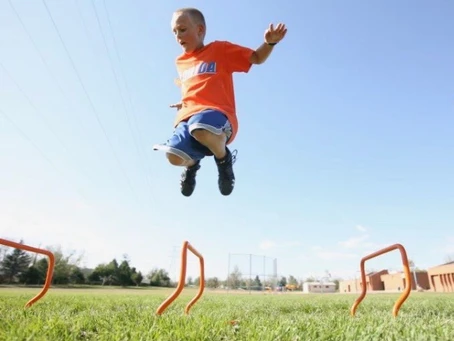Over the past 26 years of coaching athletes, I have had the pleasure of seeing some of my athletes make it to the professional level. Over time, I strongly believe that I have developed an educated perspective on what it takes to make it to an athletic pinnacle.
I worked with some wonderful parents that contributed greatly to their child’s successes. But unfortunately, also witnessed more parents, sometime unwittingly and always with the best intentions, sabotage their child’s athletic future. If they had just heeded a few simple rules, or examined a few of their motives, not only would their child been a better athlete, they would have been a better competitor, happier, and healthier individual.
If you are finding yourself excited at the potential of your child’s athletic career, I invite you take an objective look within. And if you catch yourself doing any of the three following things, I can almost guarantee your child will not end up where you believe they will.
1) Imposing your own ambitions upon your child.
I find it interesting that some of the most accomplished athletes I have known are not the overbearing parents you might expect when it comes to athletics. In fact, they may take a somewhat “laid back” attitude towards their young children’s athleticism. My personal opinion is that these parents have a greater understanding of the developmental process. Laying the foundation, learning the skill sets, and graciously handling the pitfalls of competition are prioritized above awards and accolades. They are intimately familiar with the long timeline and sacrifices required to get to the top of a sport, and even the odds of getting there. They tend to be more respectful towards the coaches and patient with the coaching process. They in short have gained a perspective most do not possess.
Parents that have not experienced competition simply never developed the mental skills sets required of an athlete. They may be experiencing athletic competition for the first time through the prism of their child; which can be a very slippery slope. Others believe their child represents a “second chance” at righting the wrongs of their not so illustrious athletic past. At any rate, the most important thing to understand is that a pre-adolescent child has three basic motivations for participating in a sport: to have fun, to socialize, and to please their parents. Too many children end up just doing the later, and that almost never works for long. These kids seldom last in a sport to high level competition, and may even end up quitting their sport, after years of development, because it is a convenient way to rebel against a parent. Post-competition, often the first words I hear from parents are evaluative or criticizing when they should be simply “did you have fun today?”
2) Over-specializing too early.
I once consulted with a somewhat anxious dad regarding his injured sons training.
The doctor had advised three weeks off of training to allow his injury to heal, but he felt this was too conservative and that his son would give up too much ground by taking this time off. He was NINE years old by the way! Obviously he had his own agenda in mind and not his son’s best interest. I seriously doubted that he would still be competing in his sport in middle school. Sadly, turned out to be true…
There has been an astounding rise in orthopedic injuries among children in the last decade. This corresponds with the rise in early single sport specialization. Kids are training too hard, too often, too repetitively and way too early without a proper foundation. Training, coaching and school athletic programs have capitalized on this, often ignoring orthopedic guidelines for training children in favor or showing early results to the parents and team. Children do not have a stable enough platform to put high volume training upon their bodies, especially during growth phases. Injuries to growth plates, vertebral discs, meniscus tears, and tendon/ligament strain can leave a child with PERMANENT damage. The body is not designed to repeat specific movements over and over, especially at an early age. We are designed for multi-planer movements which is more akin to “going outside and playing” vs. training. If you really want to develop an athlete from a young age you do just that- develop them. You develop skill sets and general coordination, strength, and agility that is AGE APPROPRIATE and even more important, DEVELOPMENTALLY APPROPRIATE. A good coach/parent should be charting growth phases and adjusting training load accordingly, monitoring rest and recovery, teaching and imposing proper nutrition, and developing mental skill sets. Yet these equally important areas of opportunity are often neglected. The bottom line is that if your child is getting chronically injured, or even if their team mates are sustaining a high level of overuse injuries, the coaching and training system is failing your child no matter how well their top athletes are performing.
3) Focusing on a Single Sport.
It is somewhat logical to believe that the more time spent training a sport the better an athlete will become over time. And no doubt the occasional Tiger Woods comes along. But this mentality more often leaves multiples of young athletes broken down on the sidelines. Developing an athlete is like unlocking a door. You must have exactly the right key that engages all the tumblers of the lock, to open the door. Training is just one of the tumblers- not the key.
A child will not self-actualize in a sport until adolescence, in order to find out what they are really good at, really enjoy, and really want to succeed at they must try a number of things. This is good, this is healthy, and it keeps them from burning out in a single sport. But too many parents see a bit of talent and aptitude and want to call it their child’s “sport.” Participating in multiple sports or activities may even help prevent the injuries associated with over-specialization. You should be asking your child if they want to try different sports, or even gently prodding them to do so. Over time they can narrow their focus. Joining the traveling “select” team at an early age may actually keep your child from finding out that they were more talented and passionate about something else.
Another mentality I have never understood, was that “my child will fall behind if they don’t go year round, specialize and / or participate on select and/or travel team(s)”… Nothing could be farther from the truth!
If your child is under the age of twelve, and you find yourself on the sideline with the words “champion,” “scholarship,” and “phenom” swirling around your head you likely need a perspective check. One of the hardest lessons you will have to learn is that at some point they will get to decide if they want to continue in a sport. And there will be nothing you can do to make them compete if they no longer have the will or desire. It is a simple fact that all your hours in the car, thousands paid out for coaching, and years spent attending games and practices will likely, statistically, lead- nowhere. But that is not to say that they will not get value out of the experience of competition. Sport can bring out the best (and sometimes the worst) in both athlete and parent alike. The values taught and gained on the athletic field will be far more valuable than any award; values such as sportsmanship, honor, integrity, fitness, hard work, and team work. Your relationship that you develop around your child’s competition will have a huge impact on their future. The decisions you make as a parent will have a tremendous effect not only on your child’s athletic development, but their health, well being, and ethics. Choose wisely.
Michael Taylor has coached and trained youth athletes to the professional level for over 26 years. He has achieved the highest level of licensing through both the National Strength and Conditioning Association and the National Academy of Sports Medicine, and is a licensed athletic coach. Michael founded and is Owner, President and Head Coach of Next Level Fitness & Athletic Development LLC. He is also an extremely saught after Motivational Speaker, regularly speaking for large groups, corporations, schools, and athletic teams. Visit www.nlfad.com for more information or email him at Tmanhoops@yahoo.com.

